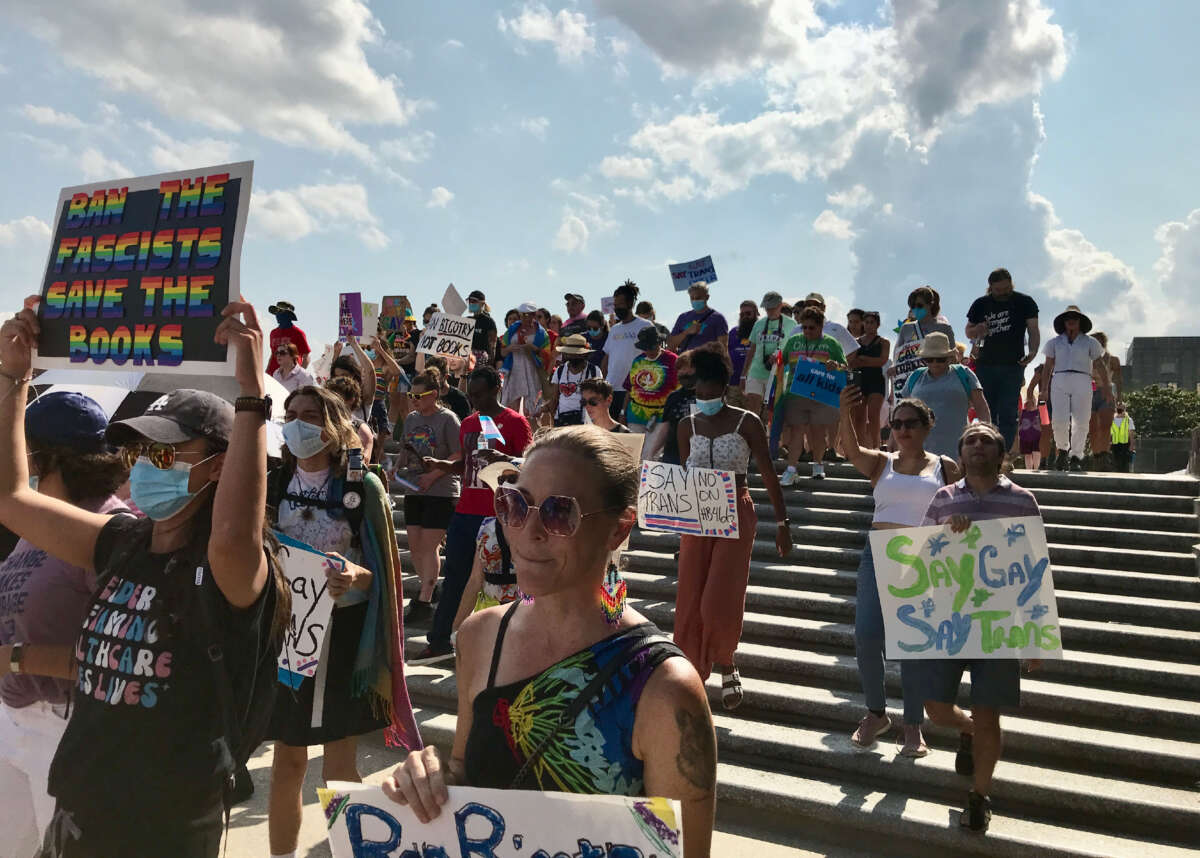This year the acid churn of existential worry that accompanies the advent of hurricane season is compounded for trans youth in Louisiana amid a legislative session that is blowing their sense of safety to smithereens. Members of the state senate and legislature have employed coercive legislature maneuvers to push forward a series of bills that will affect trans kids in their doctors’ offices, schools and public libraries.
The most concerning threat has been a proposed ban on gender-affirming care for transgender minors (HB 648), offered by State Rep. Gabe Firment, a Republican from an agricultural region in central Louisiana’s Bible belt, and per his campaign expenditures report, a member of the American Legislative Exchange Council, known for boasting of its anti-LGBTQ+ legislative wins. Firment claims to be “protecting innocent children,” but his district is also home to the nation’s only commercial hazardous waste open-burn, open-detonation facility in the country, where his constituents’ children suffer respiratory ailments, chronic sinus infections, dermatological disorders and seizures, while their parents and grandparents also suffer from horrific maladies known to correlate to open burning of hazardous waste. As the community has mounted a valiant asymmetrical fight against the facility’s permit renewal, a staff member from Firment’s office regularly attends the public meetings, sitting silently at the back of the room. In this critical legislative session, Firment has moved no bills to help any of them breathe easier.
Firment’s bill, which forces trans youth to medically detransition and bans them from receiving lifesaving gender-affirming care in the state, advanced out of the House Health and Welfare Committee with a bipartisan 14-3 vote and won in the House 71-24. Then it went down 5-4 on May 24 in the Senate Health and Welfare Committee. Video of the vote went viral on TikTok, after the committee’s Republican chairman, Fred Mills, cast the deciding vote to kill it.
The next day, a vengeful Republican senator went after the tie-breaker by linking the fate of Mills’s telehealth bill to the fate of Firment’s ban. State GOP leader Louis Gurvich also jumped in to recommend the Senate discharge Firment’s bill from Health and Welfare so it could be considered elsewhere. And that’s what has happened. On June 1, the bill was sent to the Judiciary Committee where it was heard the next day. On the strength of a party vote of 4-0, with all three Democrats boycotting, it was revived and scheduled to be heard on the Senate floor.
After rumors that legislators opposing the ban, including Sen. Jay Luneau who voted against it in the Health and Welfare Committee, had received threats to their physical safety, Louisiana Trans Advocates Executive Director Peyton Rose Michelle sent out an extraordinary email about protesting this move at the capitol, writing:
I cannot ethically let my community show up when it’ll be physically unsafe. I’m sorry that this is where we are. We’ll do everything we can to stop this bill in the Senate.
On June 5, the Louisiana Senate passed HB 648 in a veto-proof 29-10 vote. Three Democrats voted yea and one Republican, the stalwart Mills who had also been targeted for hate, challenged his colleagues.
“What’s really troubling about this bill is basically it says that if you’re presently stabilized on this treatment that you have to be weaned off.… Have you ever seen legislation where we’ve taken people off medication that’s FDA approved?” Mills said.
The bill returns to the House for a concurrence vote on an amendment to make its effective date January 1, 2024, before heading to the governor’s desk.
Louisiana Republicans have advanced two other anti-trans bills that also passed their second chamber on June 5. One would force school employees to dead-name their students and use birth pronouns unless their parents give their permission (HB 81). The second is a more stringent version of Florida’s “Don’t Say Gay” bill (HB 466) that would apply to K-12 grades. It disallows conversation between public school employees and students on the topic of gender identity and sexual orientation, a restriction that would effectively ban LGBTQ+ advocacy clubs in public schools. In Louisiana, 75 percent of LGBTQ+ students have already experienced discrimination in school, according to the 2021 GLSEN National School Climate Survey, which tracks the data.
A bill to codify into law the worst impulses of book banners that library systems have struggled with in multiple parishes throughout the state, SB 7, was also taken up and passed. It would curtail young borrowers’ access to age-appropriate material that includes information about consent, healthy relationships, and emotional and physical well-being because it also contains descriptions of “sexual conduct,” as exhaustively defined. It would require libraries to institute a card system that curtails minors’ ability to borrow material with “sexually explicit materials,” which has been interpreted by proponents of the restrictions as books with the mere presence of LGBTQ+ characters.
In Louisiana, 75 percent of LGBTQ+ students have already experienced discrimination in school.
While a national survey conducted by Hart Research Associates and North Star Opinion Research on behalf of the American Library Association found large majorities of voters (71 percent) oppose efforts to have books removed from their local public libraries, polling by the Pew Foundation showed only about 8 percent of Americans follow the news about anti-trans bills. Researchers at UCLA estimate there are 4,000 transgender teenagers and 15,700 transgender adults in Louisiana, which has a population of about 4.6 million people.
On May 27, young trans people were among the crowd of 250 gathered in Baton Rouge for a march and rally organized by the Real Name Campaign to urge Gov. John Bel Edwards to use his veto power against the bills if necessary. At a May 11 press conference, the governor called the bills unnecessary and expressed concern that passing them could increase suicidal ideation among trans youth.
“I really wish we would get along and love everybody as our brothers and sisters and not pick certain groups out and say we have to pass this legislation that is obviously an affront to them,” Edwards said.
They Feel the Hate, and It Hurts Like Hell
“Being trans means you have to be vulnerable with everyone around you,” Blu DiMarco, a trans-masculine student at Loyola University in New Orleans, told Truthout. “Our lawmakers, they are trying to eradicate us. We’ve made so much progress in the last 10-20 years, but they want to push that back — the threat is pretty overwhelming.”
DiMarco has made the trip to Baton Rouge to offer public comments at committee hearings several times.
“Whenever I was testifying at the Capitol against anti-trans legislation, there were several representatives that wouldn’t even look at us. Any time a trans person spoke, they wouldn’t look at us. They’d already decided.”

The new threats to trans youth expand upon an already discriminatory landscape in Louisiana that adds hardship and precarity on top of the rejection. Lawmakers have failed to provide basic anti-discrimination protections for LGBTQ+ workers, and DiMarco has suffered the consequences.
“My manager made me scrub tables, the legs of tables, he made me do things that he didn’t ask anyone else to do,” he said.
DiMarco quit that job after he found out that his non-trans coworkers had gotten raises, though DiMarco had worked there longer than some of them.
“I spent so long convincing myself that it wasn’t true because I am so accepting and loving of other people that it’s hard for me to think they’d do something so wrong to hurt me,” he said.
Jésus is a 2023 graduate of Benjamin Franklin High School in New Orleans, who helped organize walkouts in 2022 and 2023 at the school in protest of the “Don’t Say Gay” proposal, which died in committee in 2022. “They didn’t have the votes,” Jésus told Truthout.
Jésus expressed hope that anti-trans bills will again be defeated this year, but is concerned that the election year and deteriorating political atmosphere will not in be trans youth’s favor.
“I was very, very happy to get out of my high school,” Jésus said. “The school administration has shown us multiple times that they really just don’t care about these policies, these bills, which of course, all directly affect their students, their teachers, their libraries.”
He didn’t attend commencement because he feared he’d be called by his dead name, which would bring a “shock of shame.” He’s most proud of their school-based protests, because the walkouts were “a huge step in bringing the protests to people.”
Driving a distance is hard for trans youth, he says, because of money.
“We’ve been kicked out of our parents’ houses. We don’t have a car, like we’re living day to day. We can’t always make it out to the capitol,” Jésus said.
“Our lawmakers, they are trying to eradicate us. We’ve made so much progress in the last 10-20 years, but they want to push that back — the threat is pretty overwhelming.”
His friend Katie Rose told Truthout they’ve both faced discrimination in a 12-step program they attend. Katie felt that she faced censorship after passing out edited versions of 12-step documents with more inclusive pronouns. Censorship, she says, can look like being pressured not to bring politics into the space.
“‘Outside issue’ is the term that they love to use,” Katie Rose shared. “But it’s funny because they bring their own beliefs in with them, and they use them to separate us. We had a friend who got called a homophobic slur at a meeting, was grabbed violently, and then called a sissy F-word.”
She explained it makes it more difficult for queer people to recover, who at the same time are disproportionately more likely to develop a drug addiction.
“You face all of these obstacles trying to better yourself, trying to better your life,” she lamented. “It’s tragic.”

Both Jésus and Katie Rose see the 12-step principle of “amends” as a bedrock political concept and wish their lawmakers would take it to heart and stop harming trans kids.
“You cannot make an amends while actively participating in the harmful behavior,” Katie Rose said.
Lillie Betancur is a high school student in Pineville, in the heart of the Louisiana Bible belt, one parish over from Firment’s district. They are still sorting out their gender identity: “I’ve been using ‘nonbinary’ because it just feels a lot better than ‘girl.’ But, I’m not sure if ‘boy’ is something that I’m comfortable with. But yeah, I don’t really identify with female or male. I feel like ‘trans’ is something that I fall under.”
Lillie says even if the Republicans don’t get all the wins they want, they still will have won because people have had to divert so much activist energy in combating these bills.
“I feel like they’re using us as a target so that people won’t pay attention while they pass some other things, bills that can hurt a lot of people.” They’re particularly concerned about a bill allowing any adult to carry a concealed handgun without safety training and a license, which passed the House and is also advancing in the Senate.
Lillie is torn about leaving Louisiana — something their parents are actively considering to keep Lillie safe — but they worry about others who can’t afford to flee, or those who’ve been rejected by their families and are even more vulnerable. They heard of a 5-year-old girl already menstruating and is concerned that children with “precocious puberty” won’t be able to get hormone therapies they need.
“And now that I’ve realized that,” they said, “I know that there are a certain amount of people around me that will protect me; I feel I need to be that person that can be there to protect them.”
It’s a burden to have to contemplate all these different scenarios, and Lillie has noticed a slowdown in their artistic output as a result. “I haven’t really been doing a lot. I’ve kind of lost the joy in drawing because I just don’t feel that I can express it. If I can’t really express myself, it’s hard,” they said.

Journalist Piper Hutchinson has been following these proposed policy changes closely for the Louisiana Illuminator in the capitol and on the streets.
“Comparing last year to this year, it’s pretty obvious that anti-LGBTQ+ legislation is gaining momentum, not just here, but across the nation. I think what we’re seeing is that people who previously wanted to stay out of the fray are finding that it’s politically advantageous in an election year. Part of it is that this kind of stuff is getting bigger,” Hutchinson told Truthout.
Ed Abraham, an organizer with the Real Name Campaign, told Truthout he’s personally most inspired by watching the Poor People’s Campaign build their mass movement. Real Name, with its coalition partners in LocAll, has employed similar tactics — rallies, marches, die-ins, calls to action to contact legislators, showing up for public comments at committee hearings, holding press conferences, and the like.
But Blu DiMarco thinks the uprising at Stonewall is the model of resistance, and that while milder tactics are unlikely to throw off the multipronged yoke that’s oppressing trans kids in Louisiana, the movement needs to incubate through actions with lower stakes before it can be ready to escalate.
“I think the smaller steps are the starting point. But as the right gets more and more extreme in their pushback against trans and queer advocates, we will have to ramp up more and more.”
Correction: This article has been updated to reflect that Gov. John Bel Edwards vetoed the sports ban passed in 2021 but refused to veto the 2022 sports ban, allowing it to go into effect.
Press freedom is under attack
As Trump cracks down on political speech, independent media is increasingly necessary.
Truthout produces reporting you won’t see in the mainstream: journalism from the frontlines of global conflict, interviews with grassroots movement leaders, high-quality legal analysis and more.
Our work is possible thanks to reader support. Help Truthout catalyze change and social justice — make a tax-deductible monthly or one-time donation today.
